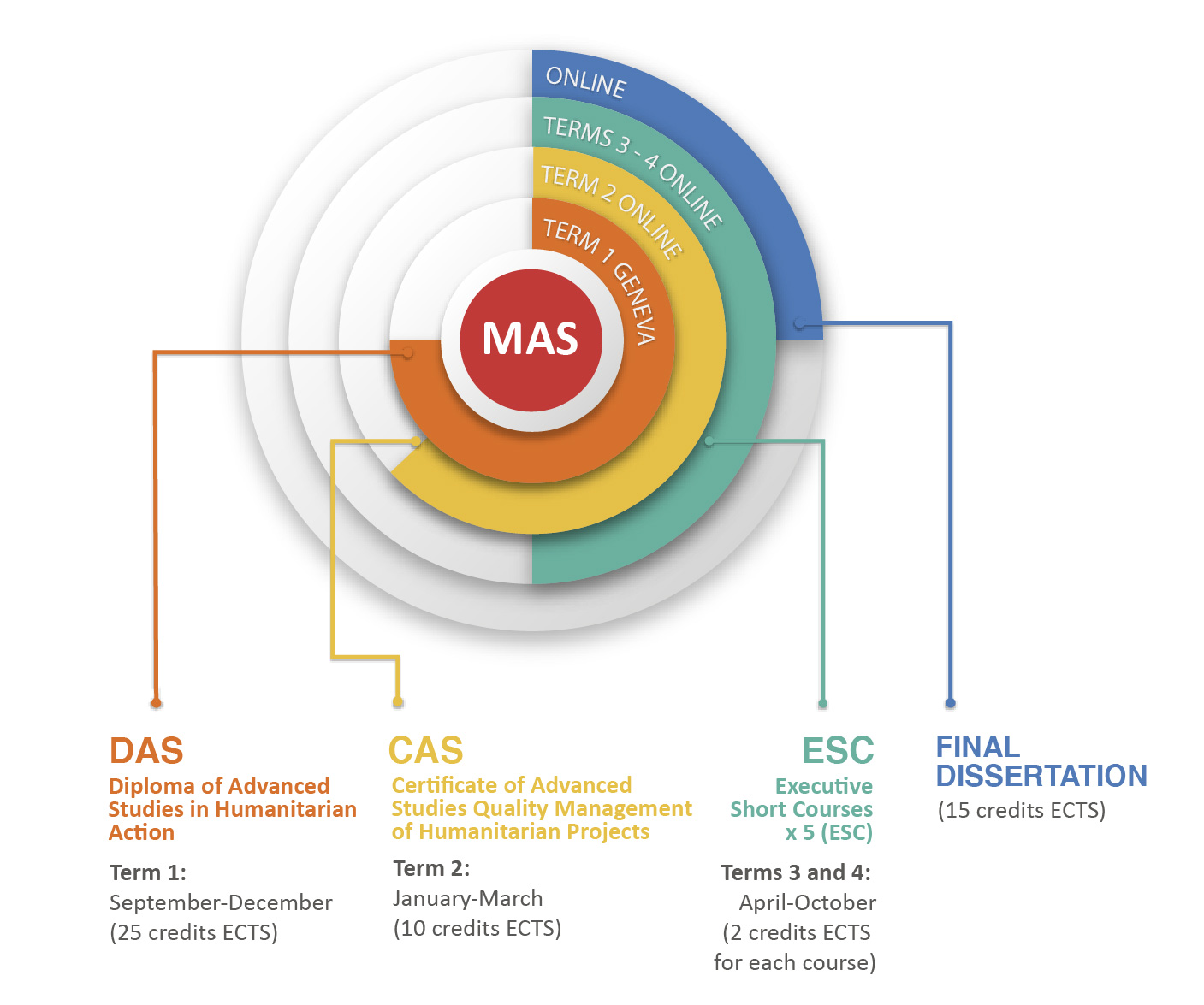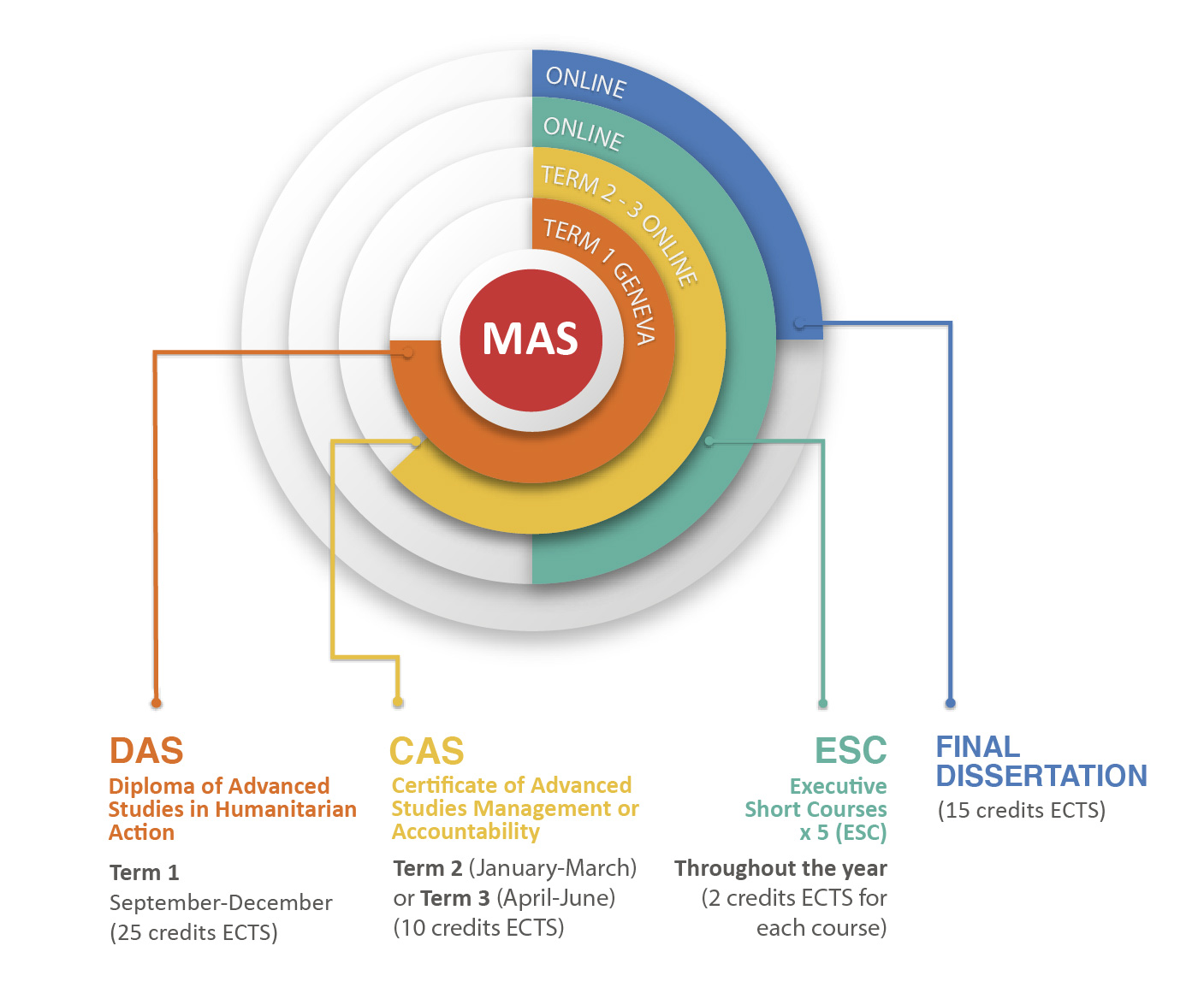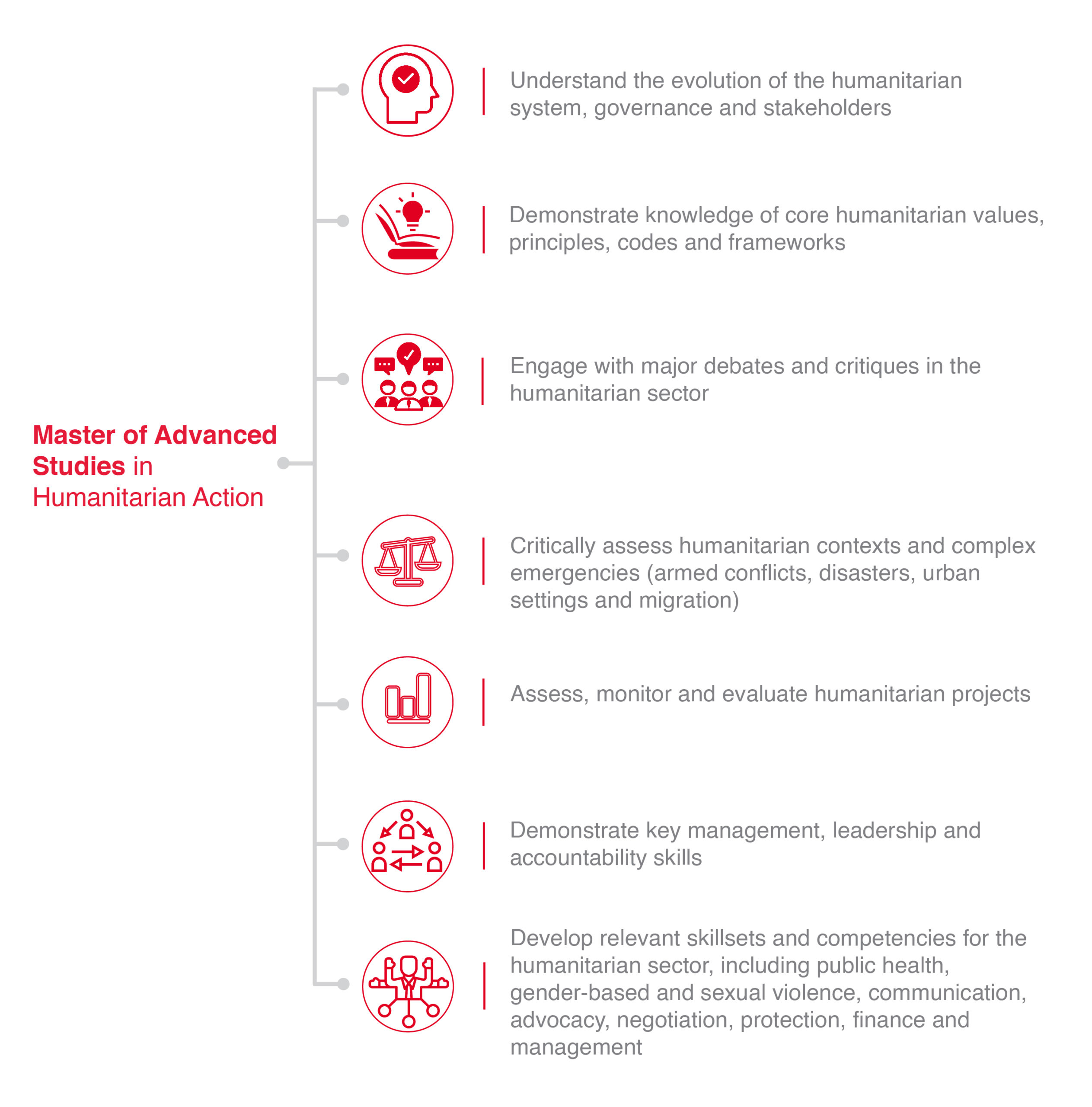Master of Advanced Studies in Humanitarian Action
This Executive Master in Humanitarian Action is a unique postgraduate course that blends online and residential learning. It provides current and future humanitarian professionals with the skills they need to respond to crises.
It has been developed in response to the growing need to understand, question and reform today’s humanitarian system, in collaboration with our partner organisations, the International Committee of the Red Cross (ICRC) and Médecins Sans Frontières (MSF).
The programme offers evidence-based, cross-disciplinary and cross-cultural education in the field of humanitarian action. This blended postgraduate course combines theoretical, practical and managerial skills in a unique adult-learning environment, to empower humanitarian professionals with reflective and critical analysis for a more effective humanitarian response.
The coursework will focus on deconstructing the humanitarian system, learning about its normative frameworks, as well as reflecting about the interactions and power dynamics among humanitarian actors. It will provide expertise in assessing methods, tools and approaches used to provide assistance to affected populations in different humanitarian contexts (armed conflicts, disasters, urban settings and migration).
To allow students to tailor their studies to their individual needs and preferences, the Master of Advanced Studies in Humanitarian Action is flexible and modular. Students can chose from two options:
| Option 1 | Master in 14 months The MAS starts in September with a first residential term (from September to December ) and then continues online (from January to October 2026). Course dates: 1 September, 2025 – 31 October, 2026 |
Option 2 | Flexible, up to 38 months This option allows participants to start the MAS with the core course (term one) or any other courses that are part of the MAS programme. Students have up to 38 months to complete the 60 ECTS credits necessary for the MAS. Possible combinations can be found in the ‘Option 2‘ section below. If you wish to apply for the MAS flexible option, please answer “flexible” to the question ‘Which program format are you applying for?‘, in your application form. After that, a team member will contact you to discuss your study plan. |
The scholarship applications for the MAS 2025-2026 are now closed. Learn more about the scholarship programme here.
- Application Deadline Excl. EU/EFTA citizens: 31 May / Only EU/EFTA citizens: 30 June
-
1 September, 2025 - 31 October, 2026 (14 months Master) /
Flexible entry (2-3 year Master) - 14 months consecutive or Flexible 2-3 Year Master
- Blended-learning (Online and residential in Geneva)
- English (though exams and dissertations are accepted in English or French)
- 60 ECTS
-
CHF 15,000 for One Year Option /
CHF 17,000 for Flexible Option (10% discount available with registration before 15 December 2025. Offer not applicable for scholarship holders.)
The Programme is made up of 4 parts for Option One, 14-month MAS, which is taken in consecutive order:

- Term 1: Diploma of Advanced Studies (DAS) in Humanitarian Action aims to offer professionals a strong understanding of contemporary humanitarian challenges through a comprehensive overview of conceptual and operational issues in past and present humanitarian crises. It is structured into five modules:
-
- Module 1: Humanitarianism
- Module 2: Contexts, Action and Consequences
- Module 3: Revisiting Vulnerabilities and Needs
- Module 4: Humanitarian Governance, Norms and Principles
- Module 5: The Humanitarians and the Social World of Aidland
-
- Term 2: Certificate of Advanced Studies (CAS) Quality Management of Humanitarian Projects addresses the essential components that guarantee the qualitative management of adapted projects and cohesive teams. It integrates fundamental principles such as inclusion, do no harm, accountability or participation into processes, methods and tools of project and people management. The whole CAS takes place online during 12 consecutive weeks.
- Terms 3 and 4: Executive Short Courses (ESC)
April-October (2 credits – ECTS / per course)A series of short elective courses focus on key approaches and evaluative tools of humanitarian contexts. Students can select five courses to develop specific skills and learn about good practices. All courses take place online during two weeks each.The elective courses include:-
- Negotiating on the Frontlines
- Cash and Voucher Assistance in Humanitarian Action: What works?
- Health Systems Assessment in Humanitarian Crises
- Humanitarian Advocacy: From Bearing Witness to Activism
- Protection of Civilians in Armed Conflicts
- Planetary Health
- Digital Innovations in Humanitarian Action: Opportunities and Challenges
-
- Final dissertation (15 credits ECTS)
Throughout the DAS, MAS students will engage in workshops designed to develop information-gathering and processing, critical thinking, analytical writing and networking skills. These workshops will help participants to write the MAS dissertation. The overall aim of the MAS dissertation is to stimulate a critical and original reflection on issues linked to humanitarian action. The submission deadline for the MAS dissertation is the end of October, 2026.
Important Notice
The information on this page reflects the intended programme structure for the academic session. Courses listed are indicative and subject to revision or change.
The study plan for Option 2 MAS Flexible Option (up to 38 months) has a more flexible choice of courses:
The flexible option offers a choice between two different Certificates of Advanced Studies (CAS):
Both CAS are delivered online.
-
- 2025, 2026 or 2027
Flexible MAS students who do not want to do a CAS or choose to only do one CAS can earn extra credits from a series of executive short courses. Students can select up to five courses (2 credits ECTS each) to develop specific skills and learn about good practices. All courses take place online for two weeks each throughout the year.
The executive short courses include:
- 2025, 2026 or 2027
-
-
- Negotiating on the Frontlines
- Cash and Voucher Assistance in Humanitarian Action: What Works?
- Health Systems Assessment in Humanitarian Crises
- Humanitarian Advocacy: From Bearing Witness to Activism
- Protection of Civilians in Armed Conflicts
- Planetary Health
- Addressing Sexual Violence in Conflict and Emergency Settings
- Digital Innovations in Humanitarian Action: Opportunities and Challenges
- Humanitarian Leadership and People Management [already included in the CAS Quality Management]
- Humanitarian Project Cycle Management [already included in the CAS Quality Management]
- Patient Safety in Humanitarian Crises: Addressing Healthcare-Related Incidents [new course to open in 2023]
-
-
-
- Final dissertation (15 credits -ECTS)
Throughout the DAS, MAS students will engage in workshops designed to develop information-gathering and processing, critical thinking, analytical writing and networking skills. These workshops will help participants to write the MAS dissertation. The aim of the MAS dissertation is to stimulate a critical and original reflection on issues linked to humanitarian action. The submission deadline for the MAS dissertation is the end of October 2026.
- Final dissertation (15 credits -ECTS)
-
Important Notice
The information on this page reflects the intended programme structure for the academic session. Courses listed are indicative and subject to revision or change.
For detailed information about admission criteria, required documents, deadlines, and the application process for the Master, please refer to the “How to Apply” page on our website.
It has been an incredibly intense yet enriching experience. We had the chance to listen, learn and discuss with a great number of professionals from the humanitarian system. I have been often challenged by the process of deconstruction and critical analysis of the humanitarian system itself however, I feel this has made me not only a better worker of the sector but a better human in general”.




Designation: Senior Lecturer and Researcher, Head of Learning